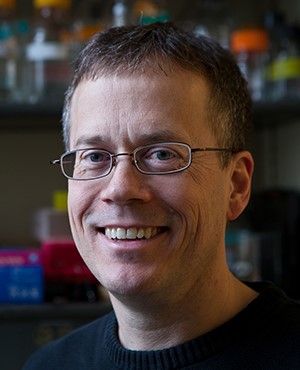Paul G. Allen Frontiers Group Names Cincinnati Children’s Scientist an Allen Distinguished Investigator
Post Date: November 6, 2019 | Publish Date:
James Wells, PhD, is one of five new awardees embarking on stem cell, tissue research to impact human health.

James Wells, PhD, at Cincinnati Children’s is among a handful of scientists with big and bold ideas to advance knowledge about our cells and tissues in health and disease who also were selected by the The Paul G. Allen Frontiers Group to be Allen Distinguished Investigators.
The Frontiers Group is a division of the Allen Institute, established by the late Paul G. Allen, a philanthropist and co-founder of Microsoft Corp.
Wells and his research team have a plan to examine how our bodies adjust to the food that we eat at the level of our individual cells.
“The field of stem cell biology has the potential to change how we treat diseases by helping precision medicine, and there’s so much we still don’t understand about the interplay between cells in living tissues or organs,” said Kathy Richmond, PhD, MBA, director of the Frontiers Group. “Our 2019 Allen Distinguished Investigators are pushing their fields in these two areas, through new technology development, probing pivotal interactions in the body that cause health to fail, and generating creative new stem cell models that will improve our understanding of different human diseases.”
Each award confers $1.5 million in research support over three years, for a total of $7.5 million in funding for studies of human diseases using stem cells and the development of new technologies to examine single cells in tissues, such as the gut. The Frontiers Group directs funding to researchers around to world whose work has the potential to accelerate scientific discoveries or launch entirely new avenues of exploration.
The Allen Distinguished Investigator program began in 2010 to support early-stage research that is less likely to receive support from traditional funding sources, but which has the potential to significantly advance our understanding of biology. With the 2019 awards, there are a total of 74 Allen Distinguished Investigators appointed since the program’s inception.
Nutrition-Sensing Cells
Wells will lead a team studying a rare type of intestinal cell known as enteroendocrine cells that sense nutrients from the food we eat and then control how nutrients are absorbed, used at fuel, or alternatively stored for later use. Wells’ team will use stem cells from patients with genetic disorders affecting their ability to absorb nutrients to study these cells in the lab. Understanding more about enteroendocrine cells, which produce hormones that regulate our ability to process food, could pave the way for new therapies for malnutrition and diseases like type 2 diabetes.
“Our goal is to be able to restore proper nutrition to people suffering from nutrient malabsorption,” said Wells. “Poor access to nutrients as well as diseases that impair intestinal function like Crohn’s, celiac, and Hirschsprung’s diseases can make it impossible for our body to absorb adequate nutrition. Enteroendocrine cells are a rare population of nutrient-sensing cells in the intestine that control virtually all aspects of nutritional regulation, from being hungry to absorbing the nutrients in the food that we eat. Our research aims to understand exactly how these cells respond to nutrients and then coordinate these functions.”
Wells is scientific director of the Center for Stem Cell and Organoid Medicine (CuSTOM) at Cincinnati Children’s, co-director of the Pluripotent Stem Cell Facility and Director for Basic Research, Division of Endocrinology.
Wells has been instrumental over the past decade helping lead a team of investigators developing organoid technology. Grown from stem cells, organoids are tiny 3D formations of human tissue that actually perform the functions of multiple cells types found in full-sized organs. Organoid experts at Cincinnati Children’s have already grown intestines that feature nutrient-absorbing villi, stomach organoids that produce digestive acids, and more.
By themselves, human organoids already provide a sophisticated tool for research. But this advance allows scientists to study how human tissues work in concert. This major step forward could begin reducing the need for animal-based medication studies, sharply accelerate the concept of precision medicine, and someday lead to transplantable tissues grown in labs.





